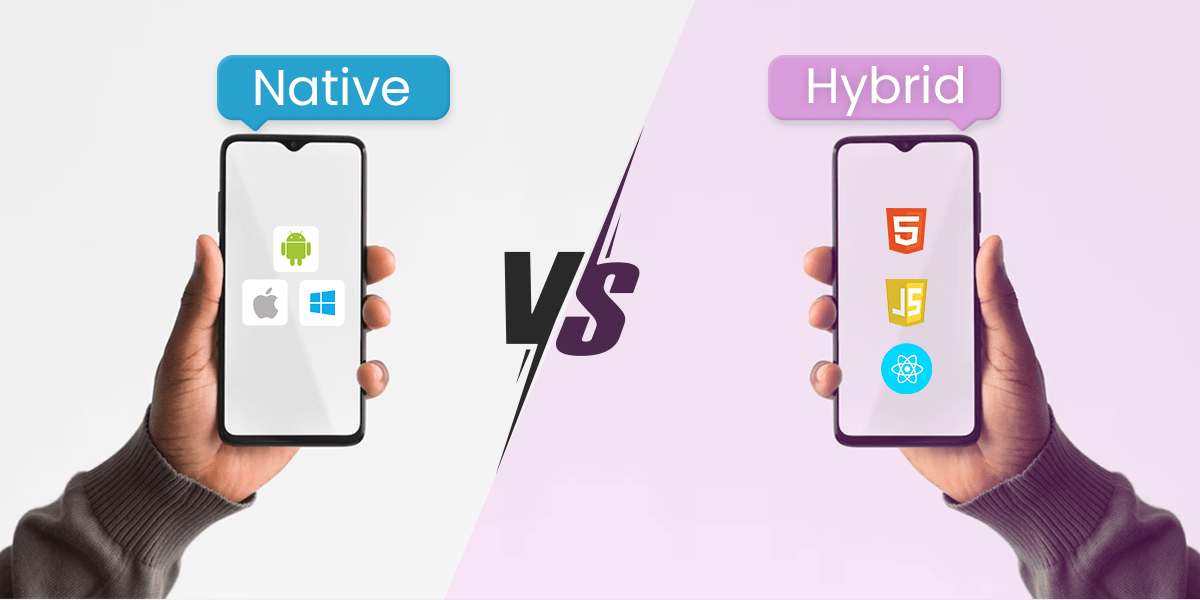Now a days mobile applications have become an integral part of our lives. Businesses and developers are constantly exploring different approaches to mobile app development to provide users with seamless experiences. Two popular methods that are often discussed are native and hybrid app development. In this article, we will delve into the key differences between these two approaches and shed light on their advantages and disadvantages.
Introduction
Mobile App Development Company involves creating applications that run on mobile devices such as smartphones and tablets. Native and hybrid app development are two distinct approaches with their own set of advantages and considerations. Understanding the differences between them is crucial for businesses and developers to make informed decisions when embarking on app development projects.
Native App Development
Native app Development Company involves creating applications specifically for a particular platform or operating system, such as iOS or Android. Developers use platform-specific programming languages and tools to build these apps. For example, Objective-C or Swift for iOS and Java or Kotlin for Android. Native apps can fully leverage the features and capabilities of the targeted platform, providing excellent performance and seamless user experiences.
Hybrid App Development
Hybrid app Development Company, on the other hand, aims to create applications that can run on multiple platforms using a single codebase. Developers use web technologies such as HTML, CSS, and JavaScript, and then use frameworks like React Native or flutter or Ionic to package the app as a native application. Hybrid apps provide cross-platform compatibility, meaning they can be deployed on both iOS and Android devices without major code changes.
Comparison of Native and Hybrid App Development
Now let’s compare native and hybrid app development across several key factors:
Performance and User Experience
Native apps typically offer better performance and smoother user experiences since they are optimized for the specific platform they are built for. They have direct access to the device’s features and can take full advantage of hardware acceleration. On the other hand, hybrid apps rely on a webview to render the user interface, which may result in slightly slower performance compared to native apps.
Development Time and Cost
Hybrid app development offers significant advantages in terms of development time and cost. With a single codebase, developers can build an app that works across multiple platforms, reducing development efforts and costs. Native app development, on the other hand, requires separate development for each platform, which can be time-consuming and costly.
Platform Support
Native apps provide deep integration with the platform they are built for, offering access to all the latest features and updates. However, this means developing separate apps for each platform. Hybrid apps, on the other hand, can be developed once and deployed on multiple platforms, allowing wider reach with fewer resources.
Access to Device Features
Native apps have an advantage when it comes to accessing and utilizing device features such as the camera, GPS, or push notifications. They can seamlessly integrate with the platform-specific APIs, resulting in richer app functionalities. Hybrid apps, although they can access some device features, may face limitations or require additional plugins to achieve the same level of integration.
Maintenance and Updates
Native apps require separate maintenance and updates for each platform, as changes and updates are specific to each operating system. This can increase the overall maintenance effort and costs. Hybrid apps, being built on a single codebase, require updates only once, reducing maintenance efforts and costs.
App Store Approval Process
Submitting native apps to app stores involves going through separate approval processes for each platform. Each store has its own set of guidelines and requirements. Hybrid apps, being cross-platform, can streamline the submission and approval process, saving time and effort.
Security
Native apps have an advantage in terms of security as they can directly utilize the platform’s security features. However, hybrid apps are not inherently less secure. Proper security measures can be implemented, but developers need to ensure the security of the web technologies and frameworks used.
When to Choose Native App Development
Native app development is recommended when:
- The app requires intensive and high-performance functionalities.
- The app needs to integrate seamlessly with the platform’s features.
- There is a budget for separate development for each platform.
- Platform-specific design guidelines need to be followed strictly.
- When to Choose Hybrid App Development
Hybrid app development is suitable when:
- The app has a limited budget and needs to target multiple platforms.
- The app’s functionalities are not performance-critical.
- Quick development and deployment are essential.
- The app requires a simple user interface and basic device feature integration.
Conclusion
In conclusion, both native and hybrid app development approaches have their own strengths and considerations. Native apps offer excellent performance and deep integration with the platform but require separate development efforts for each platform. Hybrid apps, on the other hand, provide cross-platform compatibility and cost-efficiency but may sacrifice some performance. When choosing between the two, businesses and developers should carefully evaluate their specific requirements, budget, and target audience to make the best decision.
GML Soft Labs has emerged as a leading mobile app development company in Chennai, catering to clients both locally and globally. With a team of highly skilled professionals, they have successfully delivered numerous successful projects across various industries, including healthcare, e-commerce, finance, and more. GML Soft Labs understands the unique requirements of each client and leverages the latest technologies and frameworks to develop robust and scalable mobile applications. For more details contact us today.
FAQs
Can hybrid apps achieve the same level of performance as native apps?
While hybrid apps may not achieve the same level of performance as native apps, the difference is often negligible for many applications. The performance trade-off is outweighed by the benefits of cross-platform compatibility and cost-efficiency.
Do hybrid apps have access to all device features?
Hybrid apps can access many device features using plugins or APIs. However, some platform-specific features may have limitations or require additional development efforts.
Are native apps more secure than hybrid apps?
Native apps have an advantage in terms of security as they can directly utilize the platform’s security features. However, hybrid apps can implement proper security measures to ensure a high level of security.
Which approach is more cost-effective: native or hybrid app development?
Hybrid app development is generally more cost-effective as it allows developers to build an app that works across multiple platforms using a single codebase. This reduces development efforts and costs compared to separate development for each platform.
How long does it take to develop a native or hybrid app?
The development time for native and hybrid apps depends on various factors such as the complexity of the app, the development team’s expertise, and the platform-specific requirements. In general, hybrid app development tends to be faster due to the use of a single codebase.
 seolounge
seolounge
